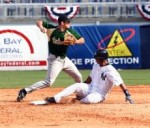Thinking about the future

The South Florida baseball team unexpectedly made a run at the Big East tournament semifinals by sweeping Notre Dame in one of the most dramatic four-game series USF has experienced.
Junior shortstop Addison Maruszak was a big part of the Bulls’ late-season success, hitting more than .400 for the Notre Dame series. He finished the season with a .364 average and 32 RBIs.
Maruszak – who plans to enter the 2008 Major League Baseball amateur draft in June – isn’t the kind of player who dodges a ball coming his way: He was hit by a team-high 20 pitches during the season.
Maruszak didn’t dodge any questions, either, as he sat down with the Oracle and talked about everything from his year with the team to steroid use.
Oracle: Which major league team would you like to be drafted by?Maruszak: I want to sign with a team this year, whichever drafts me first. I don’t really have a team preference, but it would be awesome to play for the New York Yankees. It would also be nice to be drafted by the Oakland A’s or the Florida Marlins, two teams that promote minor leaguers pretty fast.
O: What are your thoughts on steroid use in baseball?M: I’m sure some people have done it. When I played summer baseball (in 2007 for the Bourne Braves), I heard that three players on the team had been caught using. When someone has great success, they are going to be accused of something like that. (Players like) Roger Clemens have had their reputations ruined because of it, but if it turns out that they didn’t do (steroids), there is no way to fix the damage that has already been done. I’m surprised (Curt) Schilling, a veteran pitcher, hasn’t been accused of taking steroids.
O: What about steroid use in college baseball particularly?M: We have a great strength coach here at USF and it has never crossed our minds to ever use performance-enhancing drugs. I couldn’t give you a percentage of college players that do it – it’s probably small – but I’m sure that some college players are looking for that edge and only end up hurting themselves in the long run.
O: How tough is baseball’s day-to-day grind?M: Baseball is more mental than physical. Hitting a baseball is one of the hardest things to do in sports. If you are the most talented player on your team but not mentally strong, you are not going to succeed day in and day out.
O: You have played every position in the infield. Which one do you prefer?M: I played shortstop my whole life, but during the past summer I played third base and started preferring it. When I came back, the coaches put me at shortstop and I started loving it again. It’s almost like second nature to me. As a shortstop, my responsibility is to relay signs to the defense and control the pitchers with looks and picks. The shortstop also usually has a kind of priority over the rest of the defense. Positioning is very important at shortstop since I get most of the ground balls, and the coaches I have had have helped me a lot with that and made me a better player.
O: How important has it been for you to have your girlfriend and your family by your side this season?M: My girlfriend has been great for me. We have been going out for two years now, and she has been there for me during both the good times and the bad times. She allows me to keep my focus on baseball when other players have their heads elsewhere. When we first met she would be the only one soft-tossing with me when the rest of the team was gone late after practice.
My mentor, Tony Ferreira, a former major league player who won two World Series with the Royals and the Mets, has also been a big influence for me as a player and as a person. He has been like a second father to me and we still keep in touch. I send him USF jerseys and he calls me after every game. Thanks to him, I improved my velocity across the infield from 65 mph in my freshman year to about 95 mph now. I never thought of being a pitcher, but maybe I should someday – I think I have a good arm.






